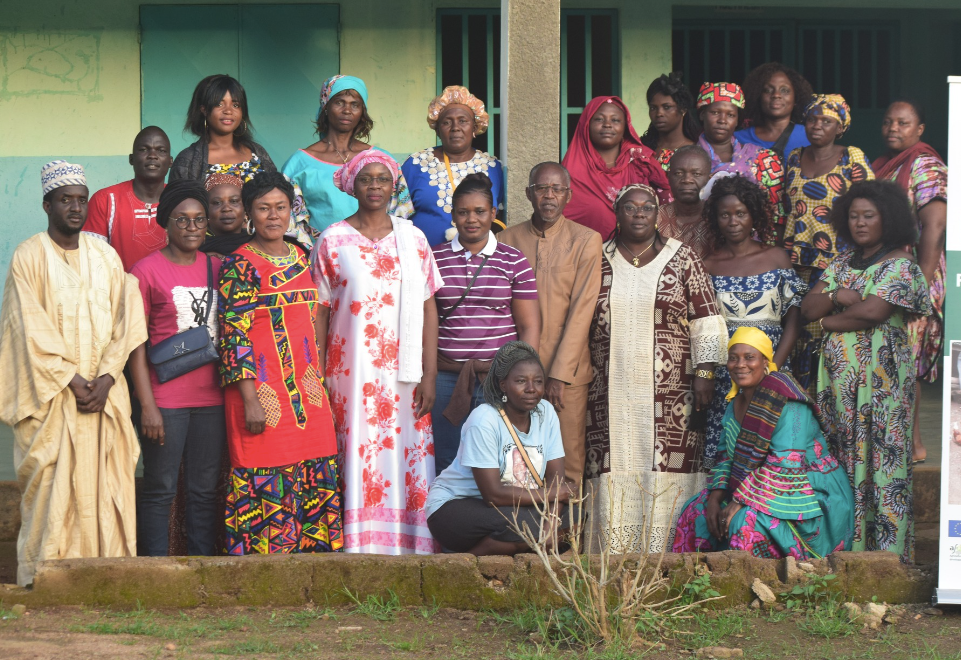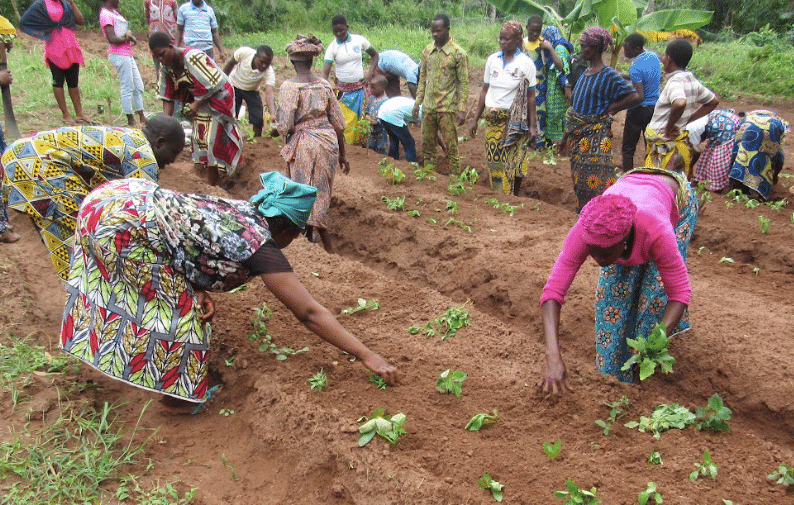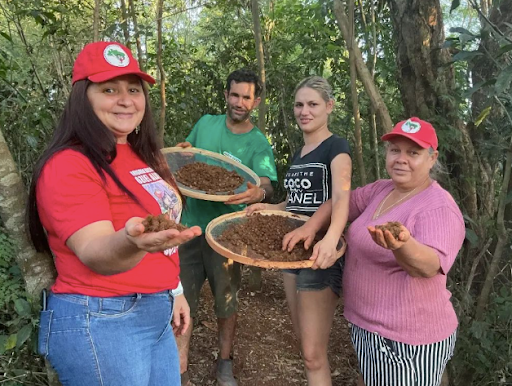Sri Lanka’s civil war lasted a quarter century and left the island nation in ruins. Tens of thousands were killed or displaced, vital infrastructure was destroyed, and social movements, once strong, faced enormous challenges.
In this context, how can an agroecology transition, rooted in community initiatives, be financed? Civil society organizations across the world, working in challenging contexts, are asking this same question.
An inspiring example of a way forward is the work of the Northern Cooperative Development Bank, or NCDB. In 2019, NCDB, was established with a federation of 1200 rural cooperatives that is modeled on a development bank. The need to rebuild rural livelihoods and revitalize social institutions was dire. Movement leadership was essential to lead an agroecology transition.
NCDB is fully owned by the cooperatives. The development bank arm provides “all the support necessary, whether it’s technology, marketing, or research to grow the movement,” said Dr. Ahilan Kadirgamar, sociology senior lecturer at the University of Jaffna, who helped create the bank and chairs its international advisory board. Kardirgamar spoke on a recent Agroecology Fund webinar about how to finance the agroecology transition.
This webinar, the second in the Agroecology Economies series, was attended by 399 people from 76 countries. We heard from 4 grantee partners and two allies about experiments with new credit models and innovative financial mechanisms for an inclusive economy fit for a large-scale agroecological transition while grounded in the particularities of territories.
NCDB created a revolving loan fund, and in 2023 lent $1.3M of its $1.68M fund to members of cooperatives, which range in size from dozens to thousands of farmers and fishers. NCDB also engages in joint ventures with cooperatives, such as for coconut oil milling or rice production, to minimize the risks of small industries undertaking value-added activities. NCDB leveraged state funds to purchase $720,000 of rice directly from farmers and provided financing to mill and market, repair and redeploy 13 farm vehicles, as well as to refurbish a fish meal plant.
Worldwide, smallholder farmers and cooperatives face similar challenges accessing the credit they need to improve production, develop value-added processing facilities and access markets for their products—regardless of how they farm. Often, the only credit they can access has extremely high interest rates, is tied to conventional production methods, or requires unreasonable collateral. Though NCDB’s credit system isn’t directed 100% towards farmers transitioning to agroecology, it offers an illuminating model.
Speakers from Cameroon, Benin, and Brazil also shared their approaches to providing affordable credit to farmers transitioning to agroecological production—or, as Dr. Rajeswari Raina, professor at Siv Nadar University, wisely remarked, “agroecology transition(s), because every landscape, culture, and food production system is different.”
In Cameroon, Madame Elisabeth Antagana, President of Concertation Nationale des Organisations Paysannes au Cameroun (CNOP-CAM), described a revolving loan fund to support its members. In this case, the fund operates out of one farmer cooperative and provides low-interest loans to its individual members.

CNOP-CAM partners with the government and other NGOs on rural development, and, in 2021, began partnering with Agroecology Fund to focus on women and young farmers practicing agroecology. With a second grant in 2023, they created a revolving fund to facilitate access to credit for women farmers.
“We would like to contribute to growing [agricultural] production, building technical capacity for women and youth, and also train them on the commercialization of agroecological products,” said Elisabeth Antagana, CNOP-CAM President.
Meanwhile, the Research and Action Group for Well-Being in Benin, GRABE Benin, a nonprofit organization focused on sustainable and ecological development, helped rural women set up a self-managed savings system, or “Caisses Communautaires,” which empowers women to help one another.

“Rural women have a lot of challenges contributing to household expenses and usually it comes down to the lack of livelihood and challenges in accessing financing,” said Géraldine Viwaylde, of GRABE Benin.“To get a loan or a credit from microfinance institutions, you have to jump through hoops and [get] huge interest rates, and that’s very difficult for women to pay back.”
Women participating in the community fund meet weekly. They pool their resources and issue low-interest loans to one or more women who want to implement a small enterprise project, farm, or buy farming equipment.
“It allows them to farm crops that have been used for ages in the local areas and that are cheaper to produce,” noted Viwaylde.
The fund is run by a committee of seven members from different organizations. Three manage the loans and negotiate partnerships with financial institutions.
Brazil’s Landless Workers Movement, or MST, has multiple programs that finance farmers transitioning to agroecology. FINAPOP finances cooperatives in land reform areas in Brazil. It was created in 2021 in response to worsening food security brought on by the pandemic. FINAPOP makes it possible for any Brazilian citizen to invest his/her savings in farmers cooperatives moving towards an agroecology transition. The aim is not just profit but, above all, to provide healthy food on a scale that is accessible to all citizens, especially those who are socially vulnerable.
“FINAPOP is the main instrument under land reform to fund organic production and strengthen the agroecology transition,” said Luis Carlos Costa, FINAPOP.
FINAPOP offers three lines of credit: capital expenditure for buying machinery or for longer-term investments to develop local industries, working capital loans for well-established cooperatives, and seed capital for cooperatives that are in their early stages.
Since its inception, FINAPOP has carried out 85 financings, totaling 59.2 million reais (~US$12 million), distributed to 53 cooperatives and associations and agrarian reform settlements, reaching 25,000 people across the country.
The Agrarian Reform Association of Parana State, ACAP-PR, another MST affiliate, joined other civil society organizations to educate elected Deputies to promote agroecology. In June 2023, the State Assembly of Deputies created the Parliamentary Coalition for Agroecology and Solidarity Economy. This group has approved 30 million reais (~6 million dollars) to the 2024 State Budget to support an agroecology transition.
Paraná laws require school lunch programs to procure food grown by family farmers using agroecological production methods. By 2030, 100% of the food provided by 2,000 municipal and state-run schools must use agroecological food, preferentially from family farmers. Despite that mandate, many school lunch programs in Paraná, and especially those in smaller municipalities, are not able to procure agroecologically-produced food.

“Production is still conventional,” in the smaller municipalities, explained Marcos Pereira, of ACAP-PR. “We have to do awareness building with the rank-and-file farmers, capacity building, and training to scale agroecological production. It is a long process.”
Other speakers discussed challenges they’ve faced and how they’re overcoming them. Several spoke about climate change.
“We have losses of crops because of climate change,” said Costa from FINAPOP. “In Rio Grande Do Sul, Brazil, there is a serious crisis with flooding in the entire state, and many cooperatives have lost their areas and their structures. We need a fund that can cover these moments of crisis and losses.”
In Cameroon, “The demand is very high. There’s a need to mobilize more resources to scale the project,” said Antagana. CNOP-CAM also wants to expand its financial training so that more women can negotiate with financial institutions.
Governance is a critical concern. “It’s essential to have transparency and accountability regarding the investments from fundraising, from investors and linking them to the final product,” noted Costa.
Each program has tailored its own approach to loan monitoring and risk mitigation. Kardirgamar, for example, said that due to NCDB’s ability to restructure loans, “non-performing loans are near zero.”
However, building a “culture of cooperativism” presents challenges, said Costa. Kardirgamar agreed, noting that cooperative rebuilding and reconstruction take precedence in Sri Lanka. “When we’re thinking about this agroecological transition, you have to first stabilize the farmers. Otherwise, it’s very unfair to ask them to take more risks.”
Ultimately, “strong and committed policy reform and high levels of public budgets [for] agroecological transitions” are necessary. That, and a redefining of finance and capital,” Dr. Raina said. “It’s not about ‘getting returns on investment’ but about ‘sharing and caring for natural and social systems.” She also highlighted the importance of testing and practicing decentralized systems and the need to combine scales, from the micro to medium to macro level.
You can access the recording of the webinar and subscribe to our newsletter to receive updates about the next webinar in our Agroecology Economies Series.